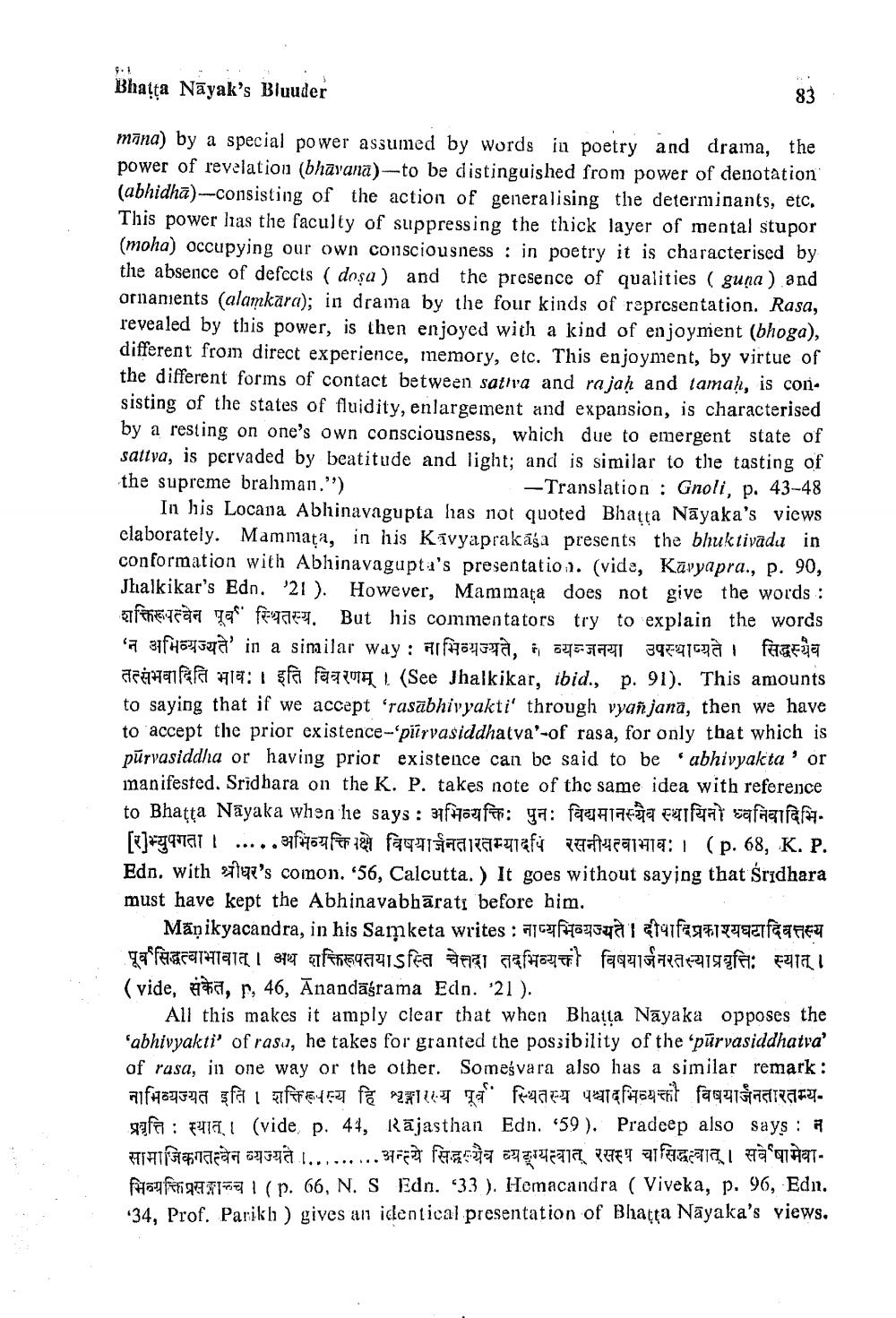________________
.
Bhatta Nāyak's Bluuder
mana) by a special power assumed by Words in poetry and drama, the power of revelation (bhavana) to be distinguished from power of denotation (abhidha) -consisting of the action of generalising the determinants, etc. This power has the faculty of suppressing the thick layer of mental stupor (moha) occupying our own consciousness : in poetry it is characterised by the absence of defects ( doşa) and the presence of qualities (guna) and ornanients (alamkāra); in drama by the four kinds of representation. Rasa, revealed by this power, is then enjoyed with a kind of enjoyment (bhoga), different from direct experience, memory, etc. This enjoyment, by virtue of the different forms of contact between sativa and rajah and tamał, is consisting of the states of fluidity, enlargement and expansion, is characterised by a resting on one's own consciousness, which due to emergent state of sattva, is pervaded by beatitude and light; and is similar to the tasting of the supreme brahman.")
-Translation : Gnoli, p. 43-48 In his Locana Abhinavagupta has not quoted Bhatta Nāyaka's views claborately. Mammata, in his Kavyaprakasa presents the bluktivadu in conformation with Abhinavagupta's presentatio ). (vida, Kavyapra., p. 90, Jhalkikar's Edn. '21). However, Mammata does not give the words: शक्तिरूपत्वेन पूर्व स्थितस्य. But his commentators try to explain the words a sifayzyà' in a similar way: Alfayora, 3771 39591cmai faccia a hafla hia: i fa facuq (See Jhalkikar, ibid., p. 91). This amounts to saying that if we accept rasabhivyakti' through vyañjanā, then we have to accept the prior existence-'piirvasiddhatva'-of rasa, for only that which is pūrvasiddha or having prior existence can be said to be abhivyakta' or manifested. Sridhara on the K. P. takes note of the same idea with reference to Bhatta Nāyaka when he says : 3figfti: ga: faanjara fatfaat safaaifa. [1]xgrat .....3467 F 14 faq a rafuiafi 1491919: 1 (p. 68, K. P. Edn. with Tere's comon. 56, Calcutta.) It goes without saying that Sridhara must have kept the Abhinavabhāratı before him.
Māņikyacandra, in his Samketa writes : cafitagsga 1 aterfaq#12yazifafiku पूर्व सिद्धत्वाभावात् । अथ शक्तिरूपतयाऽस्ति चेत्तदा तदभिव्यक्ती विषयार्जनरतस्याप्रवृत्तिः स्यात् । (vide, a, r, 46, Ānandāśrama Edn. '21).
All this makes it amply clear that when Bhatta Nayaka opposes the abhivyakti' of ras, he takes for granted the possibility of the 'pūrvasiddhatra' of rasa, in one way or the other. Someśvara also has a similar remark: नाभिव्यज्यत इति । शक्तिरूपस्य हि शृङ्गारस्य पूर्व स्थितस्य पश्चादभिव्यक्ती विषयार्जनतारतम्यgafer : Fulai (vide, p. 44, Rajasthan Edn. 59). Pradeep also says : 8 सामाजिकगतत्वेन ब्यज्यते ।.........अन्त्ये सिद्भस्यैव व्यङ्ग्यत्वात् रसस्प चासिद्धत्वात् । सर्वेषामेवाfouffigarina 1 (p. 66, N. S Edn. *33). Hemacandra ( Viveka, p. 96, Edı. -34, Prof. Parikh ) gives an identical presentation of Bhatta Nayaka's views.




